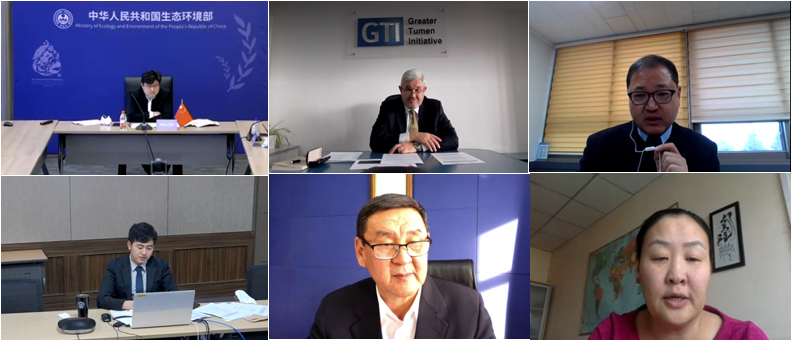
The 8th GTI Environmental Board Meeting was held on 10 November 2022 in the format of video conference, with the participation of government officials and experts from the GTI member countries and partner organizations. The event was successfully hosted by the Ministry of Environment and Tourism of Mongolia and organized by the GTI Secretariat.
The Meeting reviewed the progress on the GTI regional environmental cooperation as well as the suggestions for future cooperation, and exchanged updated information and policies on national environmental protection progress and regional cooperation activities.
The Secretariat briefed on the project “GTI Environmental Cooperation Strategy in Northeast Asia” and called for members’ advice and support to expedite the project implementation. Then, the host led the open discussion to identify one or two prioritized areas for the environmental board to be reflected in the strategic framework planning. The participants further exchanged opinions and suggestions on the updated version of the project proposal “A Study on Management Plan for Water Environment in the Tumen River”.
Last but not the least, members approved the GTI Environment Work Plan for 2022-2023. The Republic of Korea assumed the next Chairmanship of the GTI Environmental Board, and committed to closely communicate with the GTI Secretariat during the chairmanship.
Annex: Presentations from members on environmental protection progress and ways forward for NEA regional environmental cooperation
(China) Mr. Zhou Jun (Division Director, Division of Asia and Africa, Department of International Cooperation, Ministry of Ecology and Environment, MEE) introduced the progress of China’s Ecological conservation and the progress of China's participation in the regional environment cooperation. China has always attached great importance to ecological civilization development and eco-environment protection. The results in green development and pollution prevention indicate that the percentage of days with good air quality was 87.5% in 2021, representing an increase of 6.3% over 2015; the proportion of surface water at or above Grade III has risen to 84.9%, and; the deteriorating trend on soil pollution is effectively curbed. To address climate change, China issued the Working Guidance for Carbon Dioxide Peaking and Carbon Neutrality in Full and Faithful Implementation of the New Development Philosophy and the Action Plan for Carbon Dioxide Peaking before 2030, formulated measures for carbon dioxide peaking in key areas, and established “1+N” policy system for carbon peaking and carbon neutrality. The ecological conservation system has been improved with amendments to more than 20 laws and regulations, setting ecological red lines, establishing of natural reserve system with National Parks, and pilot projects implemented to restore the ecology, etc. During the COP15 held in Kunming in 2021, China committed to contributing CNY 1.5 billion to establish the Kunming Biodiversity Fund, and hoped all parties to support the consultation process on the Post-2020 Global Biodiversity Framework. Lastly, Mr. Zhou elaborated on China’s active participation in regional environmental cooperation with mechanisms including TEMM, NEACAP, and EANET.
(Mongolia) To facilitate the progress of drafting GTI strategic cooperation priories and plans, Ms. Ariuntuya Dorjsuren (Senior Officer, International Cooperation Division, Ministry of Environment and Tourism, MoET) shared the background information on environmental sub-regional cooperation and sector goals for 2020-2024 for Mongolia as reference. She first briefed on the VISION 2050 long-term development policy of the Mongolian government, and the prioritized targets for MoET during 2020-2024 including promoting low-carbon development, increasing adequate water supply for the population, environmental protection, sustainable use of national resources, promoting both classic and eco-tourism, rehabilitate and promote responsible mining, create healthy and safe conditions for the population, reduce pollution. Also, the “Green Development Policy” Chapter aims to protect the environment from various perspectives, such as reducing air pollution in Ulaanbaatar by 80% compared to 2010, registration of freshwater resources under protection area, rehabilitating 8000 hectares of land damaged by mining operations, and to reduce GHG emission by 12.3% by 2024. Moreover, she introduced the regional mechanisms that Mongolia has cooperation within the topics including air pollution quality and monitoring systems, desertification, land degradation and drought, climate change, protected area and biodiversity, and water and forest sustainable management.
(ROK) With the topic of Korea’s environmental policies: the vision and direction, Mr. Oh Seokju (Deputy Director, Division of International Cooperation, Climate Change Policy Bureau, Ministry of Environment) stated that the key policies and directions relating to the environment have been changed after the new administration was established in May 2022, with one of the national goals putting the safety and health of the people as a top priority, yet realizing carbon neutrality is still in progress towards a sustainable future. The strategic directions in implementing environmental policy include promoting science-technology-based and innovative environmental policies, making policies more applicable in the field through communication and collaboration, and proactively responding to global trends in the environment. To achieve national goals, implementation plans are required, which include the implementation of 1. Carbon Neutrality and Transition to a Green Economy (to introduce realistic GHG reduction measures and adaptation strategy, advance K-ETS, and promote green industries), 2. Climate-Resilient Water Environment (to strengthen climate change adaptation, improve the quality of water service, and create economic value from water management), 3. clean air and blue sky (to promote zero-emission vehicles, reduce the generation of PMs, and improve air quality monitoring and forecasting), 4. transition to a circular economy, 5. a sustainable ecosystem and biodiversity, and 6. offering safer and healthier environment (higher-quality environmental health services and chemical management). To strengthen regional and international environmental cooperation, Korea continuously interacts with various countries through cooperation channels including GTI, projects such as the Green ODA project, and working-level meetings or policy dialogue.

